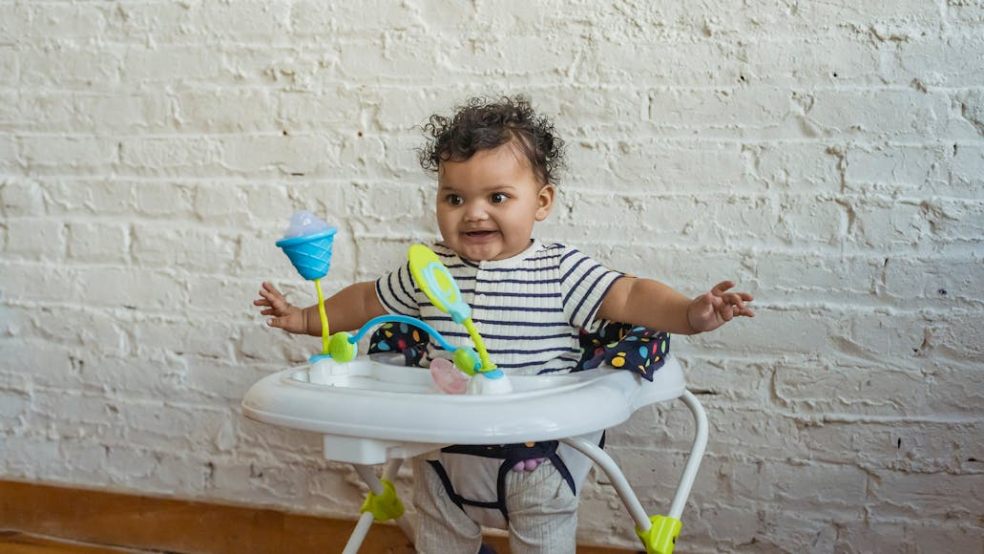
How Baby Walkers Can Support Your Baby’s Development
Can baby walkers support my baby’s development? Asking this question to friends and family may leave you in confusion. In this blog, we will eliminate this confusion for you. For many parents, baby walkers seem like a helpful tool that encourages their baby’s development in a fun and engaging way. But how do these walkers actually contribute to growth, and what should you know before introducing one?
Let’s understand the ways baby walkers support your baby’s physical and cognitive development.
How baby walkers aid physical development
Baby walkers may look simple, but they engage your child’s body and mind in ways that can aid their growth.
Strengthen leg muscles
The design of a baby walker inspires your little one to push against the ground with their legs, which builds up leg muscles over time. This is one of the most direct benefits a baby walker offers. Babies learn to exert more force as they grow stronger, which supports them in gaining the muscle strength needed for eventual standing and walking. You can say it is a “mini workout” where they’re moving around and learning how their legs work!
Since the walkers offer mobility without full weight-bearing, your child gets the chance to build muscle without straining. And because the walker moves when they push, it motivates them to keep trying and adds a bit of excitement to each push.
Coordination and balance practice
Another big plus with walkers is that they give babies a chance to practice balance and coordination. When babies first start using a walker, they might wobble and teeter, learning how to stabilise themselves. It’s an excellent opportunity to practice these skills in a supportive structure that’s easy to move.
As they scoot around, they’re learning to control their movements and adjust when they lean too far to one side or the other. Each little step helps them build coordination and prepares them for the challenges of walking unassisted.
Promoting movement exploration
One of the most enjoyable aspects of baby walkers is that they let babies explore their surroundings in a new way. Before learning to crawl or walk, babies are often limited to where they can reach or roll. With a walker, they suddenly have a little more freedom and can explore a larger area, even if it’s just inspecting the kitchen floor.
Exploration develops curiosity and gives babies the chance to observe and interact with the world. Seeing the results of their actions, like moving closer to a toy or reaching a new room, can be fascinating for them. And with every little discovery, they’re also learning to move their bodies more confidently.
Cognitive benefits of using baby walkers
Along with physical development, baby walkers also aid in cognitive growth through a few simple but important learning opportunities.
Cause and effect awareness
One surprising benefit of a baby walker is how it teaches cause and effect. Babies quickly learn that pushing with their legs makes them move, and they begin to experiment with this idea. “If I push harder, do I go faster? If I stop, what happens?” These little discoveries help them understand how actions lead to outcomes, even if they’re simple ones.
Cause and effect is an important concept that forms the foundation for more complex reasoning and problem-solving skills. Every time your child makes the walker move, they’re reinforcing this idea in a hands-on way that’s both engaging and fun.
Spatial awareness development
Navigating a baby walker involves more than just moving forward. Babies need to steer around obstacles, move away from walls, and sometimes figure out how to turn the walker to face a different direction. All this maneuvering requires spatial awareness, or the ability to sense and understand where objects are in relation to themselves. As they practice these skills, they start to understand space and distance a little better.
Sensory stimulation
Baby walkers come with attached toys, music buttons, or colourful elements. It keeps babies entertained. While these added features are fun, they also provide sensory stimulation, which is essential for brain development. Babies can touch, spin, press, and observe the colours and shapes, which keeps them interested and helps them learn through different senses.
Conclusion
Baby walkers, if used with safety measures, can be a wonderful tool for helping your child build strength, balance, and coordination while providing a boost to cognitive development as well. So, are you ready to gift your baby a baby walker?

















